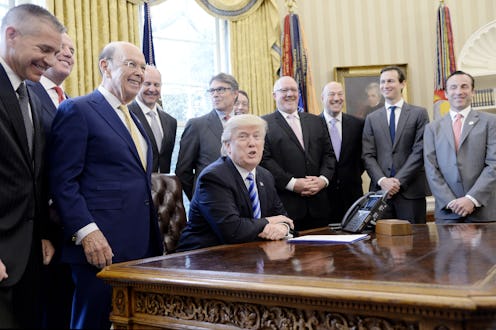
On Tuesday, the Trump administration announced that Trump's entire White House staff will not attend the White House Correspondents' Dinner (WHCD) in order to show solidarity with the president, who indicated last month that he does not plan to attend. Trump's decision to not attend the dinner breaks with years of presidential precedent and his staff's intention to do so as well further perpetuates a message of antagonism toward the press.
The White House Correspondents' Dinner is a yearly event typically attended by the president, members of his staff, reporters who cover the White House, and a host of celebrities and well-known figures in D.C. The event typically has a relaxed atmosphere and usually involves a comedic "roast" of the president as well as comedic speech delivered by the president himself. According to The New York Times, the event is meant to "symbolize comity between politicians and the press."
Trump’s refusal to attend the dinner marks the first time a President has missed the event in 36 years. The last President to miss the dinner was Ronald Regan, who was recovering from being shot in a 1981 assassination attempt (though he did call into the event).
Trump’s staff's decision to also not attend the dinner may be completely unprecedented, as The New York Times reports. On Tuesday, Trump's Press Secretary Sean Spicer explained the rationale behind the decision, saying, "The staff is standing in solidarity with the president, who has been treated unfairly [by the media] … We hope, including the president, that things improve and we can attend next year."
The White House Correspondents' Association (WHCA), which hosts the annual dinner, expressed disappointment after Spicer's announcement.
The W.H.C.A. Board regrets this decision very much. We have worked hard to build a constructive relationship with the Trump White House and believe strongly that this goal is possible even with the natural tension between the press and the administration that is a hallmark of a healthy republic.
The WHCA board's disappointment with the White House staff's refusal to attend the dinner is understandable, as the decision seems to signal a continuation and perhaps even a deepening of the antagonism between the press and the Trump administration. Trump's administration has approached the press in almost unheard of ways, with the President characterizing various reputable media outlets as "fake news" and referring to them as the "enemy of the people." The President has also occasionally blocked several news outlets who criticized him from attending certain press briefings.
Attending the White House Corespondents Dinner could have constituted a way for the President and his administration to begin to repair the fractured relationship they have with the news media. However, Trump's staff's announcement that they will now also not attend the dinner cements the administration's attitude toward the press and sets the tone for the foreseeable future of White House interactions with the media.
While both the President and his staff have expressed hope that they will be more amenable to attending the White House Correspondents' Dinner next year, it would have certainly served them (and the public) well to attend this upcoming one, as it sets a precedent for the remainder of his presidency.